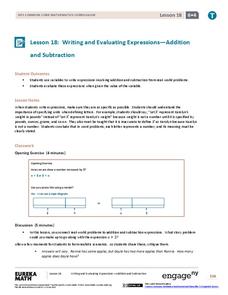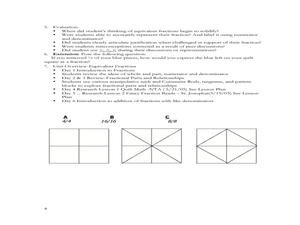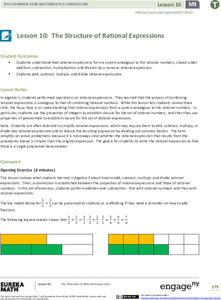EngageNY
Writing and Evaluating Expressions—Multiplication and Addition
How many people can sit around a table? The 22nd part in a series of 36 continues the work on writing and evaluating expressions to include expressions with two operations. Pupils use models to determine an expression for the number of...
For the Teachers
$1 Math
Captivate your class by having them find the value of their names, different zoo animals, musical instruments, etc.,with a mental math lesson. Using the coding formula listed, children learn to fluently estimate and calculate...
EngageNY
Writing and Evaluating Expressions—Addition and Subtraction
Let Y represent Yes to using an excellent resource. Pupils first learn to define variables using a complete description in the 19th part in a series of 36. They write expressions involving addition and subtraction in real-world...
EngageNY
Writing and Evaluating Expressions—Multiplication and Division
Don't table the resource on writing expressions for relationships in tables. Scholars investigate relationships between variables and write algebraic expressions involving multiplication and division. These expressions help solve...
EngageNY
Writing, Evaluating, and Finding Equivalent Expressions with Rational Numbers
Groups write and evaluate expressions for various phone plans and scenarios to find which is the best deal. They then compare different approaches to writing expressions for the same scenario and discuss the concept of equivalent...
EngageNY
Read Expressions in Which Letters Stand for Numbers II
Reading and writing take on a whole different meaning in math class. Young mathematicians learn to read verbal phrases by focusing on operation words. They write equivalent algebraic expressions for both mathematical and contextual...
EngageNY
Writing, Evaluating, and Finding Equivalent Expressions with Rational Numbers 2
The 20th segment in a series of 25 has learners work with percentage problems to generate equivalent expressions. Pupils find discounted prices using numerical and algebraic expressions. The task then requires individuals to find the...
Illustrative Mathematics
Writing Expressions
Practice writing algebraic expressions from written phrases. The objective is to consider two seemingly similar phrases, write them as algebraic expressions, and then simplify using the order of operations. Learners are challenged to...
EngageNY
Comparing Rational Expressions
Introduce a new type of function through discovery. Math learners build an understanding of rational expressions by creating tables and graphing the result.
EngageNY
Linear and Nonlinear Expressions in x
Linear or not linear — that is the question. The lesson plan has class members translate descriptions into algebraic expressions. They take the written expressions and determine whether they are linear or nonlinear based upon the...
EngageNY
Writing and Evaluating Expressions—Exponents
Bring your young mathematicians into the fold. Scholars conduct an activity folding paper to see the relationship between the number of folds and the number of resulting layers in the 23rd installment of a 36-part module. The results of...
Virginia Department of Education
Evaluating and Simplifying Expressions
Discover how algebra tiles help evaluate expressions. Scholars learn to use algebra tiles to substitute values in for variables and evaluate expressions. The included worksheet contains a set of evaluation problems to assess individuals'...
EngageNY
Writing Equations Using Symbols
Build upon prior equation writing experience to create more complicated equations. Lesson one in a 33-part unit builds upon the class members' sixth and seventh grade experience of writing linear equations. Several examples...
EngageNY
Equivalent Rational Expressions
Rational expressions are just fancy fractions! Pupils apply fractions concepts to rational expressions. They find equivalent expressions by simplifying rational expressions using factoring. They include limits to the domain of the...
EngageNY
Using the Identity and Inverse to Write Equivalent Expressions
The fifth installment in the series of 28 lessons helps math scholars explore the result of adding opposite numbers and multiplying reciprocals. Through this exploration, they develop a working definition of identity and inverse properties.
EngageNY
Writing Products as Sums and Sums as Products II
Explain algebraic relationships through an understanding of area and perimeter. Continuing concepts built in the third instructional activity of the series, the fourth installment of 28 asks learners to identify common expressions...
Organization for Educational Technology & Curriculum
Introduction to Variables and Algebraic Expressions
Begin your next algebra unit with this introductory lesson on variables and algebraic expressions. This plan requires a SMART board and includes a SMART notebook file. The file contains a guiding question and two learning activities that...
Curated OER
Math News
Young writers design and publish a newsletter with articles that demonstrate knowledge of mathematical concepts. They explain mathematical procedures and basic operations in a news article format. Next, they compile several articles to...
Curated OER
Half Math Quilt
Help your third graders become familiar with equivalent fractions for one-half by having them create a quilt. They will use triangles to create a quilt of equivalent fractions over a period of 6 days. As they create the quilt pieces they...
EngageNY
Read Expressions in Which Letters Stand for Numbers
Pencil in the resource on writing verbal phrases into your lesson plans. The 15th installment of a 36-part module has scholars write verbal phases for algebraic expressions. They complete a set of problems to solidify this skill.
EngageNY
The Structure of Rational Expressions
Find out when rational expressions are closed. Pupils review adding, subtracting, multiplying, and dividing with rational numbers to make the connections to operations with rational expressions. Using specific examples, learners notice...
EngageNY
Writing Division Expressions
Express division using different expressions. Individuals learn to write division expressions both with and without the division symbol in the 13th activity of a 36-part series. They consider both numerical and algebraic expressions...
EngageNY
Writing Addition and Subtraction Expressions
Symbols make everything so much more concise. Young mathematicians learn to write addition and subtraction expressions — including those involving variables — from verbal phrases. Bar models help them understand the concept.
EngageNY
Writing and Expanding Multiplication Expressions
Find out what's so standard about standard form. Scholars learn to write multiplication expressions with variables in the 10th lesson in a series of 36. They use different symbols for multiplication and translate between standard and...























